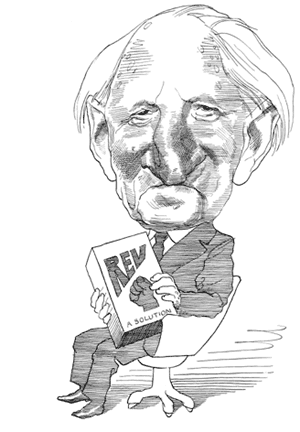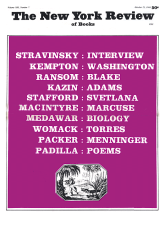At the end of One Dimensional Man Marcuse saw only one chance of revolutionary protest, and that was “nothing but a chance.” The chance was that “the substratum of the outcasts and outsiders, the exploited and persecuted of other races and other colors, the unemployed and unemployable” might turn to radical action. This would involve a meeting of “the most advanced consciousness of humanity and its most exploited force.” But the “critical theory” of society expounded by Marcuse can give us no grounds for predicting that this will happen; indeed it is of the essence of his critical theory that it cannot predict. So Marcuse in 1964.
In 1969 in An Essay on Liberation,* which professes to develop further the ideas of Eros and Civilization and of One Dimensional Man, the perspective has changed. Utopia is actually at hand, its possibilities inherent in the technology of the advanced societies. What then prevents its presence? Not just forms of political organization. The rational reorganization of society and the establishment of genuine collective control by the working class would not abolish domination. We cannot take as our political maxim “To each according to his needs” because what stands in the way of Utopia are precisely the needs which men possess at the moment. These needs must undergo a “qualitative change” if men are to be liberated. Marcuse now aspires to provide a biological basis for his theory. His biology is in fact as speculative as his metaphysics, and Marcuse explicitly disavows any scientific basis for his speculations. This does not however lead him to be less than dogmatic in his mode of assertion:
Once a specific morality is firmly established as a norm of social behavior, it is not only introjected—it also operates as a norm of “organic” behavior; the organism receives and reacts to certain stimuli and “ignores” and repels others in accord with the introjected morality, which is thus promoting or impeding the function of the organism as a living cell in the respective society.
This view is used as the basis for a political theory in which the implied elitism of One Dimensional Man is made fully explicit. Human nature is infinitely malleable. The human nature of those who inhabit advanced industrial societies has been so molded that their very needs and aspirations have become conformist—except for a minority, which includes Marcuse. The majority cannot voice their true needs, for they cannot perceive or feel them. The minority must therefore voice their needs for them; this active minority must rescue the necessarily passive majority. This passive majority includes the working class, even the new technically skilled working class. “This ‘new working class,’ by virtue of its position, could disrupt, reorganize, and redirect the mode and relationships of production. However, they have neither the interest nor the vital need to do so: they are well integrated and well rewarded.” (An Essay on Liberation, p. 55.) What is the minority which is to rescue the majority by transforming them?
Marcuse’s collection of revolutionary forces is a list so familiar in radical circles that we must be careful not to miss its extreme heterogeneity: the student movement in the United States, the black population of the urban slums in the United States, the Chinese cultural revolution, the National Liberation Front in Vietnam, Cuba. There are three elements in this collection: there are first the genuinely aspiring poor of America and peasants in Vietnam and elsewhere, who must not be confused with their self-appointed spokesmen; there are the middle-class whites of the SDS and their counterparts in Britain, Germany, and France, who in their combination of insurrectionism and anarchism exemplify what Lenin diagnosed as leftwing communism, an infantile disease; and there are the representatives of the Communist bureaucracies in China, Cuba, and Vietnam, who represent right-wing communism, an oligarchical disease. These forces have only one thing in common: they are in conflict with the governments of the advanced industrial societies. But, as both Marx and Lenin knew, to be in conflict with the established order is not necessarily to be an agent of liberation.
Marcuse devotes most of his account of the forces of liberation to an argument about the character of the student revolts. What leads him to take them to be authentic agents of liberation is above all their aesthetic quality, their style. Flower power, the language of the hippie subculture, that of soul culture, the use of four-letter words mark, so Marcuse claims, a new sensibility which breaks with the culture of the market. What traditional Marxism saw as petit-bourgeois bohemia closely allied to the Lumpenproletariat has become in Marcuse’s latest theoretical position the potential catalyst of change. Traditional Marxism took the view that it did for a very good reason: that the sensibility of bohemia effectively cuts it off from the vast mass of mankind on whom the bohemians are, in economic fact, parasitic. So of course are Marcuse’s idealized students, who have produced the first parent-financed revolts in what is more like a new version of the children’s crusade than a revolutionary movement. But this isolation of bohemia is just what Marcuse values, and the problem of communication and of joint action with the majority does not arise, because the majority are to be objects of benevolent revolutionary concern, not subjects with an autonomous voice of their own.
Advertisement
In his essay on Repressive Tolerance (in A Critique of Pure Tolerance, with other essays by R. P. Wolff and Barrington Moore, Jr.) Marcuse argues that the tolerance of the advanced industrial democracies is a deceit. The expression of minority views is allowed just because it cannot be effective; indeed the only types of expression it can have render it ineffective. The major premise of his whole argument is once again that the majority are effectively controlled by the system and so molded that they cannot hear or understand radical criticism. It follows that the people have no voice and the alternatives are not genuine democracy and the rule of an elite, but rival elites, the repressive elite of the present and the liberating elite of the Marcusean future. Freedom of speech is not an overriding good, for to allow freedom of speech in the present society is to assist in the propagation of error and “The telos of tolerance is truth.”
The truth is carried by the revolutionary minorities and their intellectual spokesmen, such as Marcuse, and the majority have to be liberated by being re-educated into the truth by this minority who are entitled to suppress rival and harmful opinions. This is perhaps the most dangerous of all Marcuse’s doctrines, for not only is what he asserts false, but his is a doctrine which if it were widely held would be an effective barrier to any rational progress and liberation.
Perhaps the oddest feature of Marcuse’s theory is that he has taken over from liberal and right-wing critics of the European revolutionary tradition a theory which they falsely ascribed to the Left, but which was rarely held by the Left until Marcuse espoused it. Both the Jacobins and Lenin believed in a temporary dictatorship of the majority over counter-revolutionary minorities—whatever they may have practiced. But it was left to Marcuse to profess a belief in a dictatorship by a minority.
What then are the true connections between tolerance, rationality, and liberation? The telos of tolerance is not truth, but rationality. Certainly we value rationality because it is by rational methods that we discover truth; but a man may be rational who holds many false beliefs and a man may have true beliefs and yet be irrational. What is crucial is that the former has the possibility of progressing toward truth, while the second not only has no grounds for asserting what he believes, even though it is true, but is continually likely to acquire false beliefs. What is it to be rational? It is a necessary condition of rationality that a man shall formulate his beliefs in such a way as to make clear what evidence would be evidence against them, and that he shall lay himself open to criticism and refutation in the light of any possible objection. But to foreclose on tolerance is precisely to cut oneself off from such criticism and refutation. It is to endanger one’s own rationality gravely by not admitting one’s own fallibility.
One of the most urgent contemporary tasks is to insist on subjecting the social and political order to continuous rational criticism and to preserve the autonomy of rational enquiry in universities and elsewhere. The institutionalization of rationality was one of the great achievements of bourgeois society. Of course the very fact of institutionalization can be used to try to isolate the practice of rational criticism and so prevent it being exercised upon the social order; and there is a continuous pressure upon universities and other institutions to make the practice of rational enquiry merely instrumental to the purposes of government. These assaults upon rational enquiry in the interests of the established social order have to be resisted. The new Marcusean radical case against tolerance makes those radicals who espouse it allies in this respect of the very forces which they claim to attack, and this is not just a matter of their theory, but also of their practice. The defense of the authority of the university to teach and to research as it will is in more danger immediately from Marcuse’s student allies than from any other quarter—even though Marcuse himself has on occasion exempted the university from his critique.
Advertisement
My view that tolerance and rationality are intimately connected is not merely an a priori thesis. The transformation of Marxism from a rationally held into an irrationally held body of theory is a transformation which was the result of Marxists cutting themselves off from possibilities of criticism and refutation. The use of state power to defend Marxism as the one set of true beliefs in the Soviet Union produced the atrophy of Marxism and the irrationality of Soviet Marxism. This use of state power was not only repressive in respect of tolerance; it was the instrument of a minority who took up toward the majority an attitude very similar to that which Marcuse advises his minority elite to take up to the majority. The majority was in the Soviet Union the passive object of re-education in the interests of their own liberation. What Marcuse invites us to repeat is part of the experience of Stalinism.
One cannot liberate people from above; one cannot re-educate them at this fundamental level. As the young Marx saw, men must liberate themselves. The only education that liberates is self-education. To make men objects of liberation by others is to assist in making them passive instruments; it is to cast them for the role of inert matter to be molded into forms chosen by the elite. The majority of men in advanced industrial societies are often confused, unhappy, and conscious of their lack of power; they are often also hopeful, critical, and able to grasp immediate possibilities of happiness and freedom. Marcuse underrates most men as they are; the false contempt for the majority into which his theory leads him underpins policies that would in fact produce just that passivity and that irrationalism with which he charges contemporary society. The philosophy of the Young Hegelians, fragments of Marxism, and revised chunks of Freud’s metapsychology: out of these materials Marcuse has produced a theory that, like so many of its predecessors, invokes the great names of freedom and reason while betraying their substance at every important point.
This Issue
October 23, 1969
-
*
Beacon,104pp., $5.95; $1.95(paper)
↩




